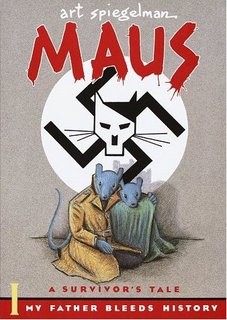Enlightenment as Mass Destruction*
 I'm told that my great grandparents, a Jewish family from Northern Europe - Germany (then Prussia) and Poland region - immigrated to the U.S. around 1900, effectively evading the Hitler's genocidal wrath before it emerged. The families they left behind were not so lucky.
I'm told that my great grandparents, a Jewish family from Northern Europe - Germany (then Prussia) and Poland region - immigrated to the U.S. around 1900, effectively evading the Hitler's genocidal wrath before it emerged. The families they left behind were not so lucky.
Art Spiegelman's family also came from N. Europe (Poland), but not until after the war. Spiegelman was 29 in 1977 when he began interviewing his father about his experiences in the Holocaust. I just finished reading his Pulitzer Prize-winning, 2-volume comic, Maus: A Survivor's Tale (Pantheon Books, 1993) that recounts those interviews with his father. Well worth the read. It has provoked in me a morbid curiousity about my own distant relatives who didn't survive the war.
Spiegelman's father and mother were living and eventually hiding in Poland when they were captured by the Nazis and sent to Auschwitz for the final year of the war. As the Allied troops advanced, his father was made to dismantle the massive gas chambers and crematoria amidst the Germans' hasty retreat. Through stories such as these, Spiegelman writes with remarkable detail about the constant threats on his father's life and the survival strategies that kept him out of the camps for so long as well as those that kept him alive once he could no longer avoid them. [See a sample page from the book here.]
As if to drive the point home, tonight I saw Sacha Baron Cohen's Borat, the much talked about and critically acclaimed story of a Jew-hating Kazakh journalist who traverses the U.S. provoking outrageous and unscripted reactions from anti-semitic, racist, sexist, and homophobic Americans. The anti-semitic humor ("In Kazakhstan, three main issues: economic, social, and Jew.") - made even more perverse by the fact that Cohen himself is Jewish - is both hilarious and sickening, as when the gun store clerk suggests which types of guns would be best for hunting Jews. In this film, it should be said, the "-isms," and the people who espouse them, are the ultimate butts of the joke.
Given my reading of Maus, subsequent thinking about my family's heritage, and now seeing Borat, it's been an odd and thought-provoking week. I find that I'm still coming to terms with the recency of those 11 million horrific deaths - it was only 60 years ago! In that light, the current American animosity toward Jews, gays, Muslims, and women unearthed in the film is a grim reminder that we may not have changed as much as we'd like to think. If the film reveals our discrimination, Abu Ghraib and the debate(!) about torture expose our willingness to act. If the world slips into more fighting among nations for the top spot as some social scientists predict, will we see another Holocaust? Is it realistic to think that genocide will never happen here? Have we really come so far?
* The Culture Industry: Enlightenment as Mass Deception, by Theodor Adorno and Max Horkheimer (1944).
Labels: anti-semitism, Borat, Maus
November 12, 2006 5:11 AM
Is it realistic to think that genocide will never happen here? Have we really come so far?"
Genocide did happen here, this nation is built on genocide and racism. American Indians were wiped out by a calculated policy to obtain their land (though most American Indians did not have the Anglo notion of property rights, they were forcibly removed through massacre).
Additionally, Hitler claimed to have studied the United States and Britain with great admiration about their efficiency in killing. Secondly, he admired slavery.
Putting two and two together, Jews and other Eastern Europeans were enslaved, tortured, and slaughtered.
November 14, 2006 9:58 PM
ah jeff, my brother, your schpilkas made me so kvell that i'm shvitzing. -joanna
November 15, 2006 11:30 AM
Tom: You're right, of course. But all of that - Native American genocide and African American slavery - occurred before the U.S. became a core (wealthy/powerful) state.
I think many people want to argue that the U.S. has, in this post-WWII/post-Civil Rights Movement era, moved beyond such disgraces. Genocides are typically found in peripheral states or, as in the case of the Holocaust, during periods of intra-core competition after the decline of a superpower.
Joanna: I have no idea what you're saying! Should I be concerned? Is it pornographic?
November 15, 2006 7:31 PM
I am unclear if you think it means that it makes the enslavement of Africans and the massacre of Indians more acceptable because the U.S. was not a super-power when it occured...the term "but" evokes that interpretation. (I am not judging you, just judging what you wrote).
Like Bonilla-Silva's work where European-Americans say "I'm not racist, but..." and then they will go on to contradict themselves and say something racist.
Too, the enslavement of Africans financed the industrial revolution in the U.S. and the industrialization aided the U.S. in becoming a super-power. Additionally, most uranium processing occurs on present Indian lands and the health consequences are probably pretty dismal --->enabling U.S. to maintain status as nuclear superpower.
Nonetheless, racial oppression of one group is related to the racial oppression of another group (What happened to European Jews is related to what happened to Africans in America and Indians, well...where they already live).